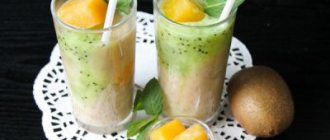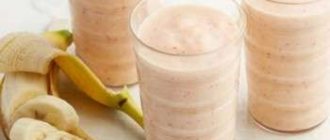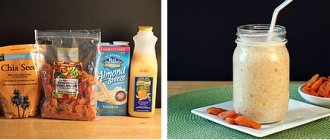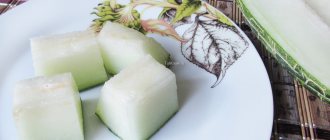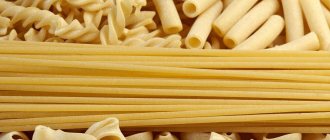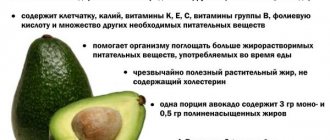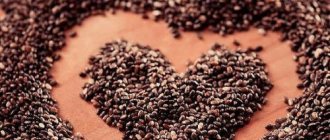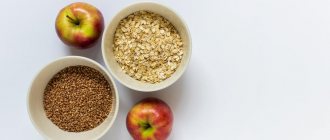Properties of fruit smoothie
Nutritional value and composition | Vitamins | Minerals
How much does a fruit smoothie cost (average price for 1 liter)?
Moscow and Moscow region.
300 rub.
The cool fruit smoothie got its original name from the English word smoothie, which literally means “uniform or smooth.” Smoothies refer to non-alcoholic and fruit cocktails. The first smoothie cocktail appeared in the 30s of the last century in the sunny American state of California. The 60s saw a boom in the popularity of smoothies as a vitamin and dietary drink, which began to be sold in health food and organic food stores throughout the United States.
A fruit smoothie has three main ingredients - milk, ice and fruit juice. Often, fresh fruits or berries are used for smoothies, which are ground in a blender with ice and milk. As a rule, smoothies contain berries such as strawberries, raspberries, cherries, currants or lingonberries, as well as blueberries, blackberries and wild strawberries. Of the fruit components of the drink, the most popular are bananas, mango, watermelon, melon, grapes, apples, kiwi, pineapple and others.
Currently, there are a large number of smoothie recipes that, in addition to classic ingredients, use additives in the form of nuts, syrups, honey, tea or herbal infusion. In addition, a new type of vegetable smoothie is gaining momentum these days. The calorie content of a smoothie depends primarily on the composition of the product. The usual calorie content of a smoothie with milk does not exceed 86 Kcal per 100 grams of product. A fruit smoothie will be even lower in calories, which cannot be said about drinks with chocolate, nuts or sweeteners.
Calorie content of Smoothie. Chemical composition and nutritional value.
Nutritional value and chemical composition of “Smoothie”.
The table shows the nutritional content (calories, proteins, fats, carbohydrates, vitamins and minerals) per 100 grams of edible portion.
| Nutrient | Quantity | Norm** | % of the norm in 100 g | % of the norm in 100 kcal | 100% normal |
| Calorie content | 352 kcal | 1684 kcal | 20.9% | 5.9% | 478 g |
| Squirrels | 12.3 g | 76 g | 16.2% | 4.6% | 618 g |
| Fats | 6.2 g | 56 g | 11.1% | 3.2% | 903 g |
| Carbohydrates | 61.8 g | 219 g | 28.2% | 8% | 354 g |
| Alimentary fiber | 6 g | 20 g | 30% | 8.5% | 333 g |
| Water | 12 g | 2273 g | 0.5% | 0.1% | 18942 |
| Ash | 1.7 g | ~ | |||
| Vitamins | |||||
| Vitamin B1, thiamine | 0.45 mg | 1.5 mg | 30% | 8.5% | 333 g |
| Vitamin B2, riboflavin | 0.1 mg | 1.8 mg | 5.6% | 1.6% | 1800 g |
| Vitamin B4, choline | 40.4 mg | 500 mg | 8.1% | 2.3% | 1238 g |
| Vitamin B5, pantothenic | 1.12 mg | 5 mg | 22.4% | 6.4% | 446 g |
| Vitamin B6, pyridoxine | 0.24 mg | 2 mg | 12% | 3.4% | 833 g |
| Vitamin B9, folates | 23 mcg | 400 mcg | 5.8% | 1.6% | 1739 |
| Vitamin E, alpha tocopherol, TE | 1.6 mg | 15 mg | 10.7% | 3% | 938 g |
| Vitamin H, biotin | 20 mcg | 50 mcg | 40% | 11.4% | 250 g |
| Vitamin K, phylloquinone | 2 mcg | 120 mcg | 1.7% | 0.5% | 6000 g |
| Vitamin RR, NE | 4.6 mg | 20 mg | 23% | 6.5% | 435 g |
| Niacin | 1 mg | ~ | |||
| Macronutrients | |||||
| Potassium, K | 330 mg | 2500 mg | 13.2% | 3.8% | 758 g |
| Calcium, Ca | 52 mg | 1000 mg | 5.2% | 1.5% | 1923 |
| Magnesium, Mg | 129 mg | 400 mg | 32.3% | 9.2% | 310 g |
| Sodium, Na | 20 mg | 1300 mg | 1.5% | 0.4% | 6500 g |
| Sera, S | 88 mg | 1000 mg | 8.8% | 2.5% | 1136 g |
| Phosphorus, P | 328 mg | 800 mg | 41% | 11.6% | 244 g |
| Chlorine, Cl | 73 mg | 2300 mg | 3.2% | 0.9% | 3151 g |
| Microelements | |||||
| Iron, Fe | 3.6 mg | 18 mg | 20% | 5.7% | 500 g |
| Yod, I | 6 mcg | 150 mcg | 4% | 1.1% | 2500 g |
| Cobalt, Co | 5 mcg | 10 mcg | 50% | 14.2% | 200 g |
| Manganese, Mn | 3.82 mg | 2 mg | 191% | 54.3% | 52 g |
| Copper, Cu | 450 mcg | 1000 mcg | 45% | 12.8% | 222 g |
| Selenium, Se | 28.9 mcg | 55 mcg | 52.5% | 14.9% | 190 g |
| Fluorine, F | 45 mcg | 4000 mcg | 1.1% | 0.3% | 8889 g |
| Zinc, Zn | 3.1 mg | 12 mg | 25.8% | 7.3% | 387 g |
| Digestible carbohydrates | |||||
| Starch and dextrins | 60.1 g | ~ | |||
| Mono- and disaccharides (sugars) | 1.2 g | max 100 g | |||
| Essential amino acids | |||||
| Arginine* | 0.82 g | ~ | |||
| Valin | 0.63 g | ~ | |||
| Histidine* | 0.27 g | ~ | |||
| Isoleucine | 0.45 g | ~ | |||
| Leucine | 0.71 g | ~ | |||
| Lysine | 0.47 g | ~ | |||
| Methionine | 0.14 g | ~ | |||
| Methionine + Cysteine | 0.45 g | ~ | |||
| Threonine | 0.43 g | ~ | |||
| Tryptophan | 0.22 g | ~ | |||
| Phenylalanine | 0.6 g | ~ | |||
| Phenylalanine+Tyrosine | 1.09 g | ~ | |||
| Nonessential amino acids | |||||
| Alanin | 0.54 g | ~ | |||
| Aspartic acid | 1.02 g | ~ | |||
| Glycine | 1.14 g | ~ | |||
| Glutamic acid | 2.18 g | ~ | |||
| Proline | 0.72 g | ~ | |||
| Serin | 0.57 g | ~ | |||
| Tyrosine | 0.5 g | ~ | |||
| Cysteine | 0.32 g | ~ | |||
| Saturated fatty acids | |||||
| Saturated fatty acids | 1.4 g | max 18.7 g | |||
| 14:0 Miristinovaya | 0.02 g | ~ | |||
| 16:0 Palmitinaya | 1.31 g | ~ | |||
| 18:0 Stearic | 0.06 g | ~ | |||
| Monounsaturated fatty acids | 2.15 g | min 16.8 g | 12.8% | 3.6% | |
| 18:1 Oleic (omega-9) | 2.14 g | ~ | |||
| Polyunsaturated fatty acids | 2.33 g | from 11.2 to 20.6 g | 20.8% | 5.9% | |
| 18:2 Linolevaya | 2.28 g | ~ | |||
| 18:3 Linolenic | 0.05 g | ~ | |||
| Omega-3 fatty acids | 0.05 g | from 0.9 to 3.7 g | 5.6% | 1.6% | |
| Omega-6 fatty acids | 2.28 g | from 4.7 to 16.8 g | 48.5% | 13.8% |
The energy value of the Smoothie is 352 kcal.
Primary Source: Created in the application by the user. Read more.
** This table shows the average levels of vitamins and minerals for an adult. If you want to know the norms taking into account your gender, age and other factors, then use the “My Healthy Diet” application.
Benefits of smoothies
The creators of the drink were able to consider the incredible benefits of smoothies, which are expressed in the vitamin and mineral composition of the product. Fruit smoothies are considered a fundamental component of a healthy and balanced diet. The thing is that when making a smoothie, all the beneficial vitamins and minerals from fruits, berries, milk or vegetables are transferred into the chemical composition of the final product.
Doctors and nutritionists recognize the exceptional benefits of smoothies for human health and well-being. Therefore, fruit smoothies are considered dietary products. Smoothies are placed on a par with such low-calorie and certainly healthy dietary products as tofu cheese, vegetables and fresh fruits. Smoothie drink is included in the diet of athletes.
A fruit cocktail with milk is considered an excellent antioxidant and a source of strength and energy. Fruit smoothies can be easily prepared at home. To do this, you will need fruits, berries or vegetables of your choice. You can also use fruit juice, milk, syrup, honey or nuts. The ingredients of a smoothie depend only on your imagination and taste preferences.
We suggest making a tropical fruit smoothie from kiwi, banana and a mug of canned pineapple. Mix all the ingredients in a blender, add a glass of orange and half a glass of pineapple juice, as well as ice. Whisk well, the end result should be a fruity viscous mass, which is best served in a tall glass with a straw for cocktails. Just 10 minutes of your time and your healthy diet smoothie drink is ready.
How to lose weight with smoothies?
There are several options for losing weight with smoothies.
Option number 1. Smoothies for weight loss in combination with a diet.
Using a balanced diet, you can replace one meal (breakfast, lunch or dinner) with a smoothie. Both tasty and varied.
Option number 2. Fasting day.
A fasting day with smoothies can be done once a week. On this day you should only drink smoothies, clean water and green tea.
Option number 3. Always instead of dinner.
A smoothie instead of dinner is a great option to keep your body in good shape. By replacing your evening meal with a light, healthy smoothie for weight loss, you will not feel hungry and, at the same time, saturate your body with a portion of vitamins. With this approach, good health is guaranteed.
Lose weight with smoothies - it's very easy and enjoyable!
Smoothie is a wonderful drink that is made from beautiful ripe, fresh vegetables, fruits, berries and herbs! Everyone knows that smoothies are good for health and beauty. After all, these are vitamins and bioactive substances that enter the body in their pure form. This is good for the immune system, keeping the skin fresh and, in general, for improving the health of the whole body and preventing various problems. There are also smoothies for weight loss and cleansing the body. These are drinks that contain products that help gently remove toxins, waste, and other unhealthy substances from the body. We have selected ten unique smoothie recipes for weight loss and cleansing the body and decided to share them with you. Choose the option that you like best.
Effect on the body
Main benefits of smoothies:
- retain plant fibers, antioxidants and vitamins;
- contain easily digestible carbohydrates, which provides a boost of vivacity, energy, improved mood and increased performance;
- have an anti-stress effect;
- strengthen the immune system;
- cleanse the body of waste and toxins;
- improve digestion thanks to fiber;
- satiate and quench thirst at the same time;
- promote weight loss.
The last property is the most important, since many consider this drink as the basis of a dietary diet. And it’s not in vain:
- normalization of digestion leads to the fact that fats are not used as reserves, but are converted into useful energy;
- cleansing the intestines can remove a couple of kilograms;
- prolonged saturation leads to a decrease in the total daily calorie intake and allows you to maintain the diet to the end;
- improving metabolism activates lipolysis;
- removing excess fluid from the body means losing another 1-2 kg;
- eliminating cholesterol plaques also promotes weight loss;
- The puree-like consistency of cocktails normalizes the water-salt balance.
So smoothies have one continuous benefit for health in general and for weight loss in particular. True, in order to extract it, you need to be able to prepare it correctly. After all, the presence of high-calorie foods and sweeteners in the composition can lead to the opposite result.
Through the pages of history. No one knows exactly who and when invented this drink and called it that way. The first version says that the term appeared among hippies, and the second claims that such cocktails were invented by Pacific surfers.
Smoothies for weight loss and cleansing the body
All of the recipes listed are suitable for inclusion in a cleansing diet. Such drinks promote weight loss and prevent various diseases. However, you shouldn't rely on smoothies alone. After all, health and beauty cannot depend on one product. In order to achieve your desired goal, it is important to follow the rules of a healthy, balanced lifestyle! And this means properly distributed, active physical activity, proper nutrition and, of course, an ecological way of thinking. Being in harmony with nature, with yourself and the world around you, you can count on the fact that by adding one or more delicious smoothies to your diet, you will get the expected effect!
When choosing recipes, it is important to consider contraindications. If you have any doubts or have chronic diseases, consult a specialist!
Kinds
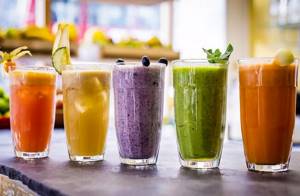
There are different types of smoothies, and you need to know which types can be used for weight loss and which ones cannot.
Fat burning
Some foods contain substances that activate the production of growth hormone. These are vitamin C, taurine, methionine, magnesium and iodine. Under their influence, cells begin to divide intensively (nails thicken, hair stops falling out and becomes thicker, muscle mass increases), requiring additional energy from the body. This leads to the consumption of fat reserves.
Another group of foods has the so-called “negative calorie content”: more energy is spent on their processing than they can provide to the body. And again fat reserves are consumed.
These products are called fat burners, and if you make a smoothie from them, the effect will not be long in coming. Here is their list:
Vegetables:
- broccoli;
- carrot;
- cucumbers;
- tomatoes;
- savoy cabbage;
- beet;
- pumpkin;
- cauliflower.
Greenery:
- leaf salad;
- arugula;
- celery;
- asparagus;
- spinach;
- sorrel.
Fruits:
- avocado;
- pineapples;
- oranges;
- grapefruits;
- kiwi;
- lemons;
- mango;
- tangerines;
- apples.
Berries:
- strawberry;
- cranberry;
- raspberries;
- currant;
- blueberry.
Drinks (for dilution):
- Pineapple juice;
- water;
- green tea;
- kefir;
- mineral water;
- tomato juice.
Fat-burning smoothies are the most effective for eliminating fat deposits in problem areas of the body; they can be used to lose belly fat.
Dietary
Losing weight is only possible if you burn more calories per day than you take in. Accordingly, you need to increase physical activity and reduce calorie intake. Diet smoothies made from foods with a minimum amount of calories will help with this. They are mainly prepared from vegetables, since berries and fruits contain more sugar.
Recommended products (calorie content below 40):
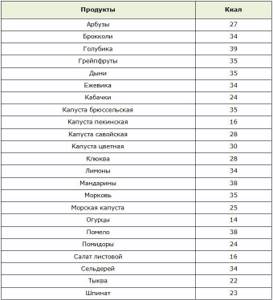
But it is not recommended to abuse these products (calorie content above 50):
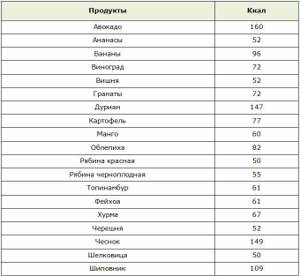
Diet smoothies are recommended for overall weight loss as part of any weight loss program.
Detox
Making smoothies from foods that are known for their cleansing properties makes excellent detox drinks. They can be used to organize fasting days.
What we cook from:
- from greens: lettuce, dill, celery, parsley;
- from drinks: mineral water, freshly squeezed juices, green tea;
- from vegetables: beets, carrots, cabbage, cucumbers, pumpkins;
- from oats and bran;
- from nuts;
- from dried fruits;
- from fruits: plums, apples, cherries, lemons, peaches, pears, apricots, grapefruits, oranges;
- from berries: black currant, strawberry, cranberry, lingonberry, gooseberry.
What we try not to add:
- alcohol;
- coffee;
- seasonings;
- radish;
- spices;
- seeds;
- Black tea;
- spinach;
- sorrel.
Detox smoothies are recommended for general slagging of the body, as well as for cleansing certain organs and systems.
Dairy / protein / protein
If you dilute fruits and berries in a smoothie with milk, kefir, yogurt or whey, they will become a good source of protein for the body. During weight loss, it plays an important role. With its deficiency, energy primarily begins to be extracted from muscle fibers, rather than fat reserves. Their breakdown leads to general depletion of the body. Protein prevents this, promotes muscle mass building and redirects all forces to burning adipocytes.
Protein smoothies are suitable for those who are actively involved in sports and are not just losing weight, but are sculpting their body so that it is slim, beautiful and sculpted.
This is interesting. In American bars, there is a distinction between “thick” and “thin” smoothies. The latter does not contain additional sweeteners and removes the natural sugar contained in berries and fruits.
Refreshing smoothie with cucumber, apple and mint
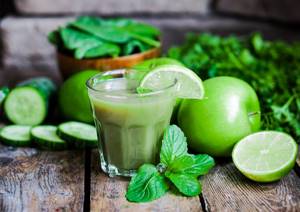
Another option for a diet cocktail that will be an ideal dinner replacement. And which is very easy to prepare! To do this, simply blend half a green apple, a small cucumber, a couple of mint sprigs and 100 ml of regular or plant milk with a blender. Light and invigorating, such a smoothie will lift your spirits, and it will become much easier to lose those extra centimeters on your waist and hips.
